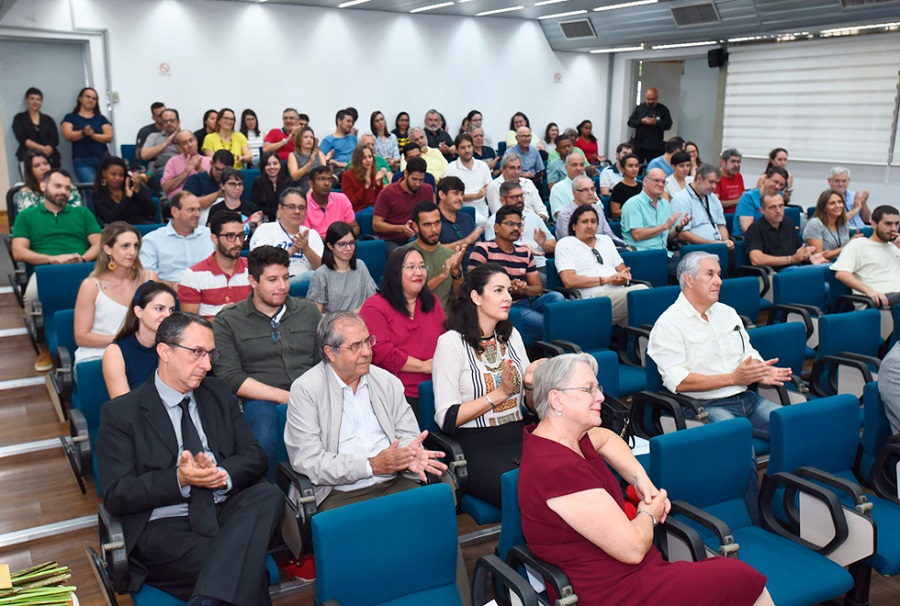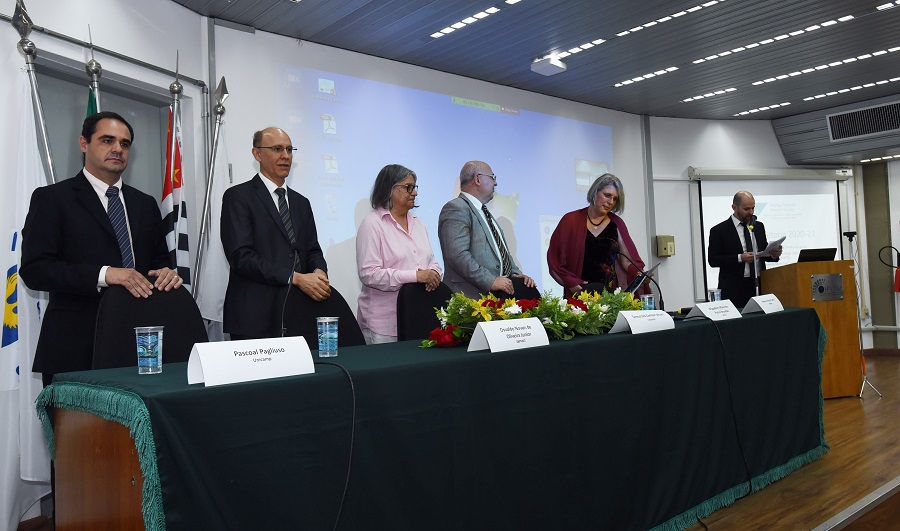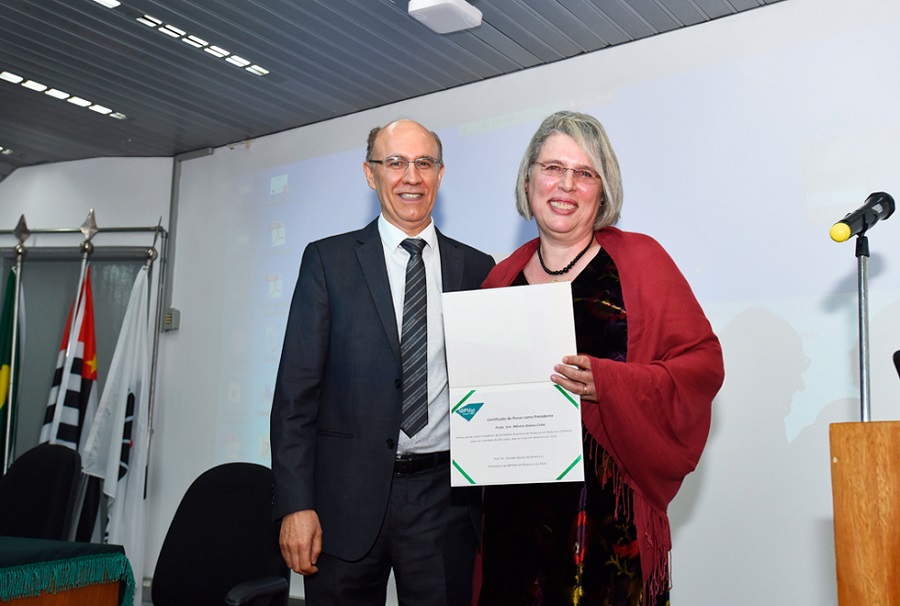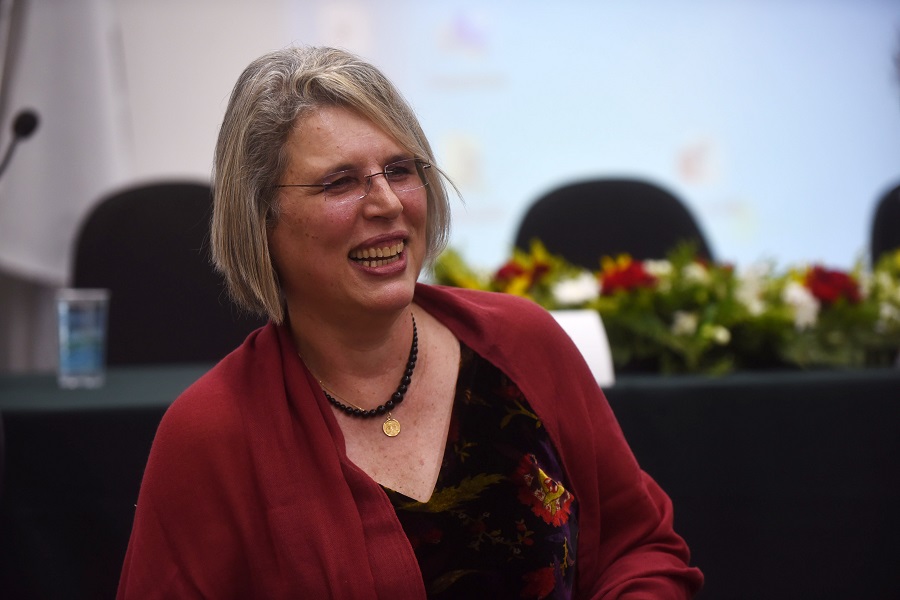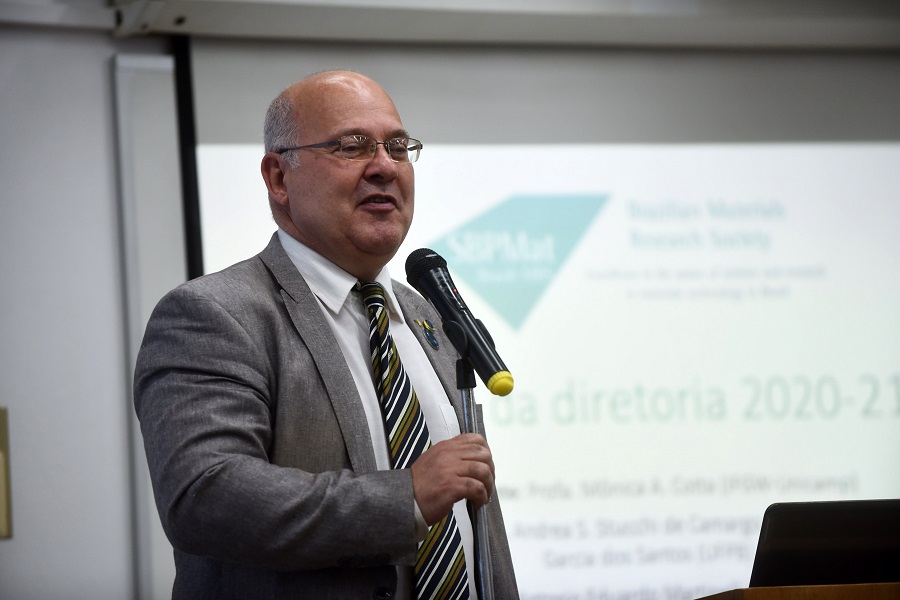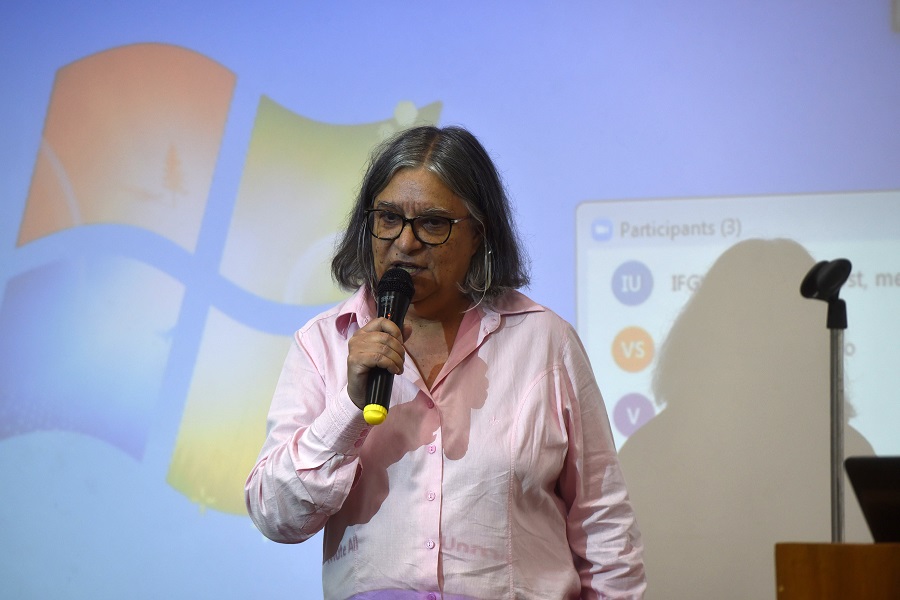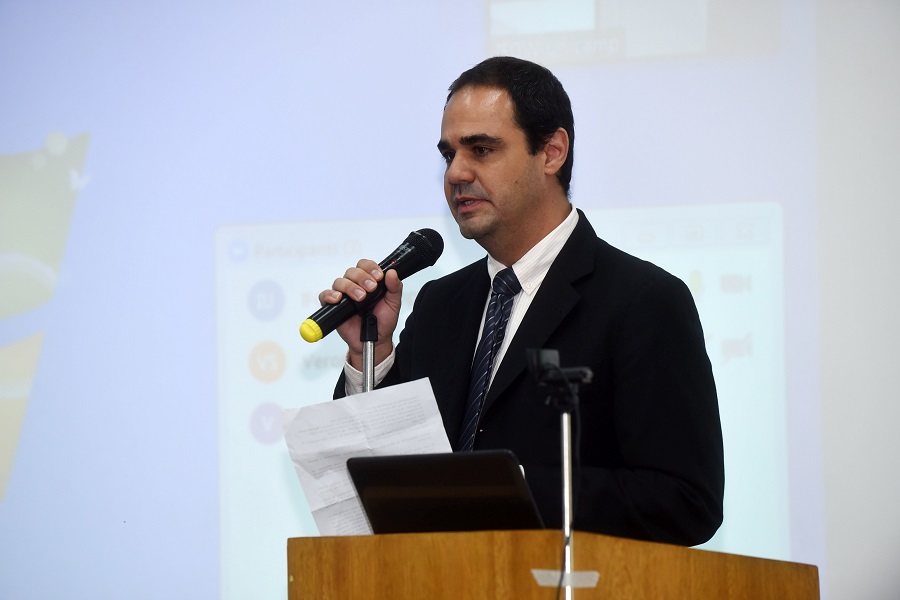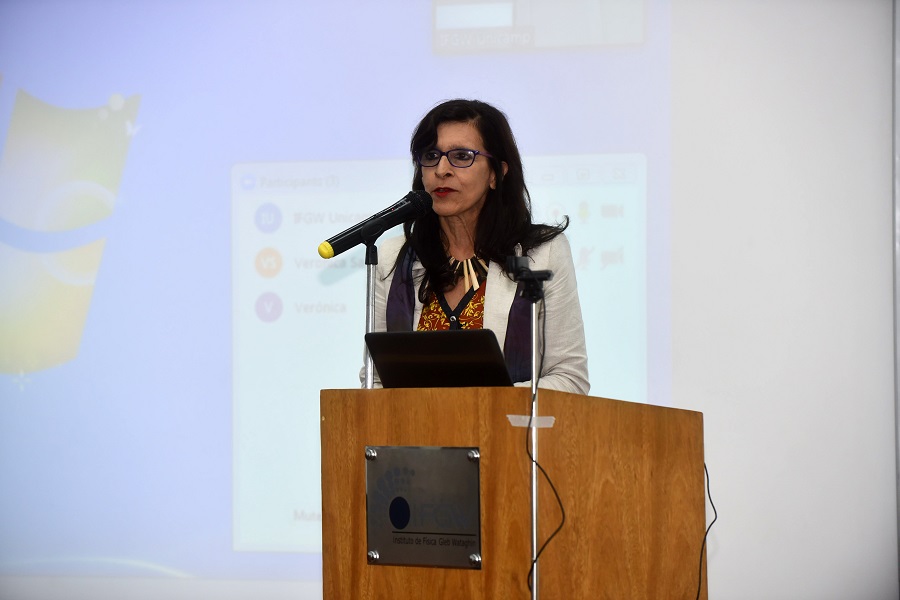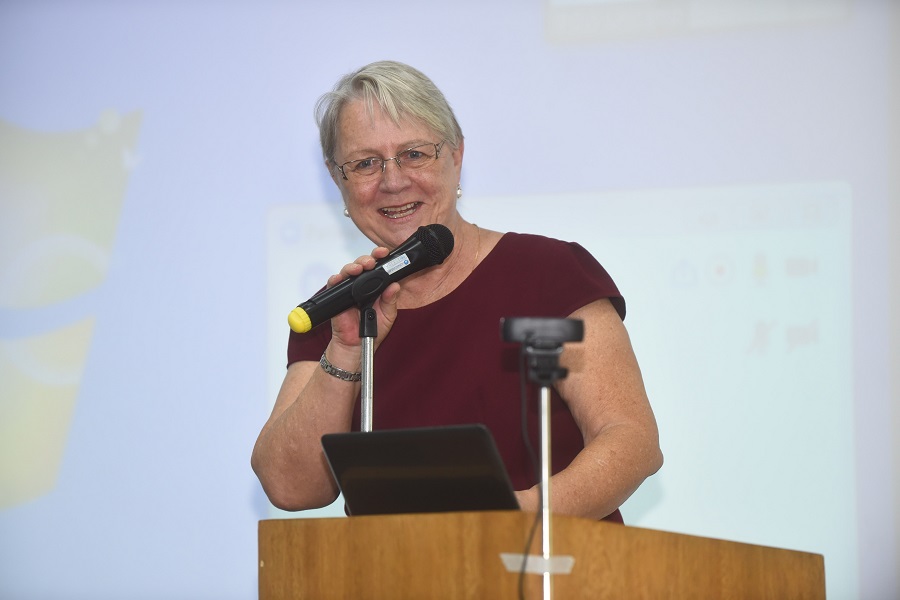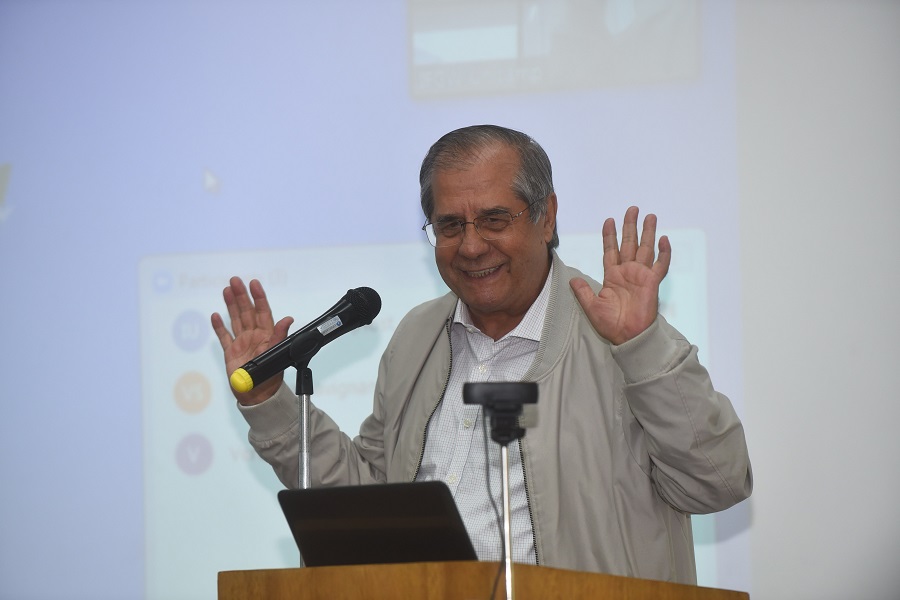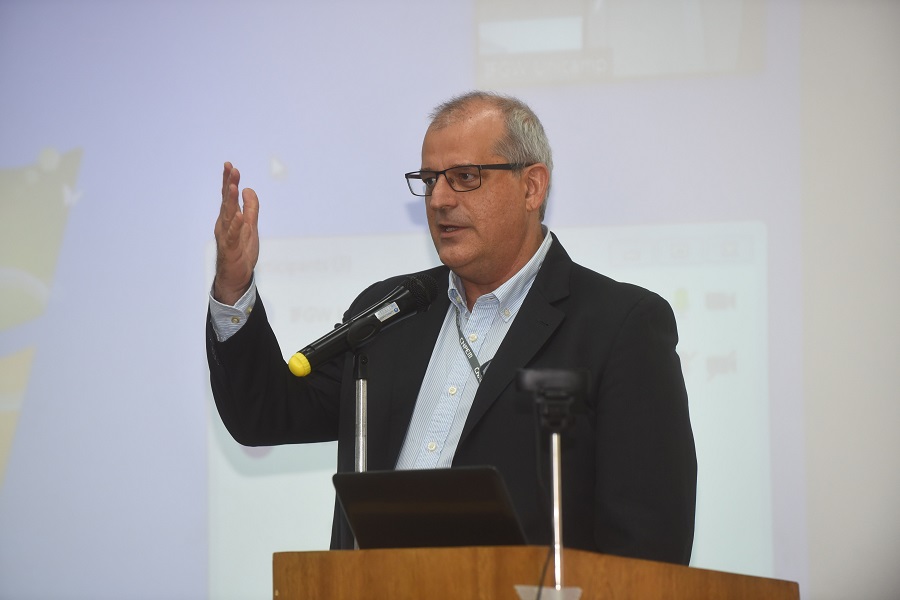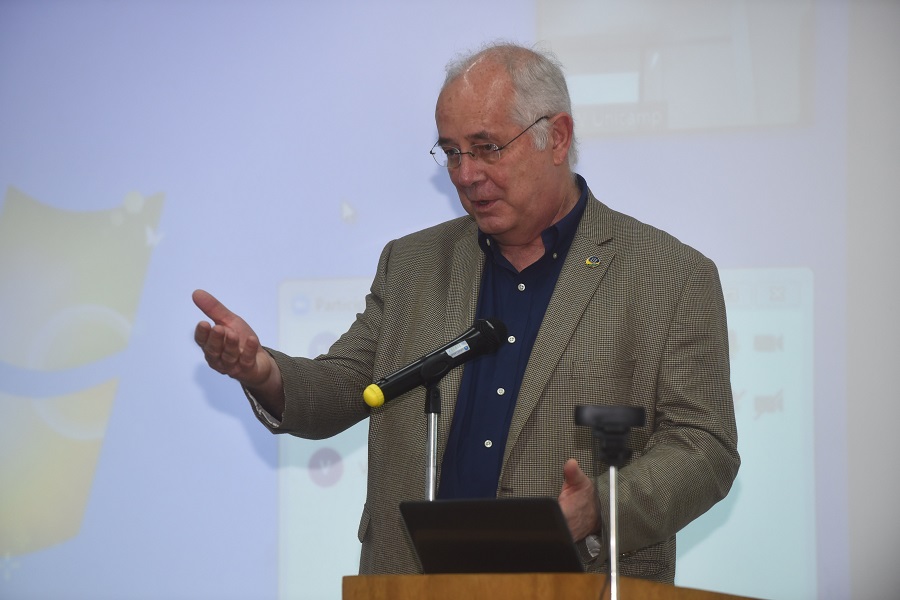The new board of directors of the Brazilian Materials Research Society (B-MRS) took office on the morning of February 14, in a ceremony held in the auditorium of the Gleb Wataghin Institute of Physics at Unicamp (IFGW – Unicamp), in the city of Campinas (São Paulo state), with the presence of more than 80 people.
Elected by the members of B-MRS in October 2019 for the February 2020 to February 2022 term, the new board is chaired by Prof. Mônica Alonso Cotta (IFGW-Unicamp), who became the first female president of B-MRS.
Another characteristic of this board is the broad representation in geographical terms (directors from the south, southeast, northeast and north Brazilian regions), disciplinary terms (backgrounds in Physics, Chemistry and Materials Engineering) and gender (four men and three women).
Along with the president, Rubem Luis Sommer (CBPF) assumed his duties as director of administration, finance and patrimony, as well as five scientific directors: Prof. Andrea Simone Stucchi de Camargo (IFSC-USP), Prof. Antonio Eduardo Martinelli (UFRN), Prof. Iêda Maria Garcia dos Santos (UFPB), Prof. Ivan Helmuth Bechtold (UFSC) and Prof. Newton Martins Barbosa Neto (UFPA).
In her speech, the president highlighted the interdisciplinary nature of the materials research community and, in particular, that of B-MRS. “One of our strengths derives precisely from the synergy between the areas, and this requires good communication skills between researchers, respecting complementary expertise, sharing knowledge, to obtain a product that is greater than the sum of its parts,” said Cotta, who added that communication with the lay public will be one of the fronts that the new board will focus on as a priority.
In addition, Professor Cotta highlighted the importance of the scientific community in taking a stand against political decisions with no scientific basis that can affect the lives of millions of people. “B-MRS will continue to support the excellent work that the Brazilian Society for the Advancement of Science and the Brazilian Academy of Sciences have lead in recent years, working with Congress in a purposeful and meaningful way, and demonstrating strong defense of Brazilian research and science,” she added. See full speech here.
Professor Cotta received this position from her predecessor, Prof. Osvaldo Novais de Oliveira Junior (IFSC-USP), who chaired B-MRS for two consecutive terms. The former president, who received praise for his management in the speeches of the authorities, expressed words of gratitude to the B-MRS team, to the directors and members of the deliberative council that accompanied him, and to the B-MRS members who participated in the actions of the society. “I am sure that the next years will be even better,” she said.
Speeches given by the authorities: economic-social development and women in science
The ceremony, which lasted a little over an hour, also included the words of Unicamp authorities (the vice-chancellor, Prof. Teresa Dib Zambon Atvars, and the director of the IFGW-Unicamp, Prof. Pascoal José Giglio Pagliuso) and the representatives of several entities: Brigadier Maurício Pazini Brandão, from the Brazilian Ministry of Science, Technology, Innovations and Communications (MCTIC); Prof. Marcia Cristina Bernardes Barbosa, director of the Brazilian Academy of Sciences (ABC); Prof. Carola Dobrigkeit Chinellato, board member of the Brazilian Physics Society (SBF); Prof. Antonio José Roque da Silva, director of the Brazilian National Center for Research in Energy and Materials (CNPEM); Prof. Ronald Cintra Shellard, director of the Brazilian Center for Research in Physics (CBPF), and Elson Longo (CDMF-UFSCar), who was president of B-MRS in the 2004-2005 biennium.
In the brief speeches given, some of the constant subjects were the conquest of spaces by women, the need to unite different individuals and organizations for the survival and advancement of science and technology, and the seriousness and impact of the research developed in Brazilian universities. One of the most discussed subjects was the transformation of scientific knowledge into wealth, not only as a desire or need, but also as a fact of the current Brazilian reality, which can be observed mainly in startups and companies resulting from universities and research centers.
The first speaker was Brigadier Maurício Pazini Brandão, professor at the Technological Institute of Aeronautics (ITA), who participated in the ceremony as regional director of the representative office of MCTIC in São Paulo. In his words, he stressed that the materials research community must go beyond the production of scientific articles. “We want products and innovation with invoices,” he said.
Then, the vice-chancellor of Unicamp returned to the question raised by Brandão, with some data on companies founded by former students of that university. Together, these “daughter companies” have an annual turnover of R$ 7.9 million, equivalent to three times the annual budget of Unicamp, informed Professor Atvars, who ended the brief speech highlighting the achievements of women, often obtained by means of “triple shift work.” More examples of companies and innovations from the academic world, in the area of ceramic tiles and cosmetic products, were presented later in the speech by Professor Elson Longo.
Professor Pascoal José Giglio Pagliuso spoke about Professor Mônica Cotta, his colleague at the teaching staff and the IFGW board, where she is the associate director. The IFGW director described the new B-MRS president as tireless, vigilant, with a huge heart and a prominent position in matters involving minorities and human rights. “She is the first woman and the first professor at Unicamp to occupy this impactful position in Brazilian research,” he highlighted.
Afterwards, Marcia Barbosa, professor at UFRGS and director at ABC, took up the issue of transforming knowledge into wealth and affirmed that basic science does in fact generate development. A scientist with outstanding performance in favor of the participation of women in the exact sciences, Barbosa said she was concerned with the present times and called on the scientific community to all work “together.” “The new B-MRS board will know how to build windmills to transform the energy of tsunami and gather together other entities,”she said. Work in partnership was also highlighted in the words of Professor Carola Dobrigkeit Chinellato (Unicamp), who hoped that the new board will make new bonds and extend the scope of B-MRS.
In the penultimate speech of the ceremony, Antonio José Roque da Silva, who directs Sirius (construction of the new Brazilian synchrotron light source), commented on the budgetary difficulties he has faced to carry out the project, sometimes linked to the difficulty of politicians and society in general in understanding the times and actors involved in scientific research and its transformation into social development and wealth. “We need to better explain this time scale,” he urged.
Concluding the speches, Ronald Cintra Shellard brought some data that show the imbalance, in Brazil, between the research carried out in the universities (where there is more freedom to choose a theme) and in the research institutes (in which the scientific work aims to fulfill a determined mission). The ratio of university/institute researchers, which in the world ranges from 1/1 to 4/1, in Brazil it is 12/1, said the director of CBPF. According to the scientist, this does not reflect an excess of professionals at the university, but a lack of researchers in the country, particularly in research institutes.

